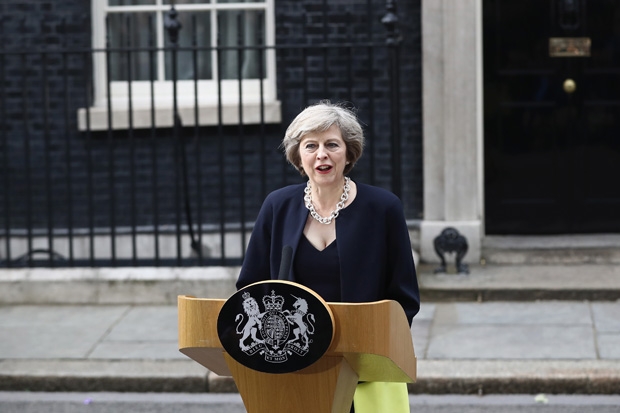This week’s lead article, as read by Lara Prendergast
Helga Hunter met her husband Michael when he was a Scots Guardsman serving in Münster in 1968. She moved back with him, and they have lived in Britain ever since. Last week, she was astonished to receive a letter from the Scottish National Party saying that she is still ‘welcome in Scotland’ and faces ‘no immediate changes’ to her status due to the Brexit vote. But as a German national, she now faces ‘great uncertainty over how events will unfold’. To the SNP’s enemies, this seemed a deplorable scare tactic intended to fuel indignation and stoke demand for a second independence referendum. It’s certainly deplorable. But in fact, the scare tactic came from Downing Street.
Since announcing her candidacy for the leadership of the Conservative party, Theresa May has adopted a fringe position on the status of immigrants from the European Union. The subject came up repeatedly during the referendum campaign: what would Brexit mean for the three million EU nationals living here? The Brexiteers were unanimous: their right to stay in Britain would be unaffected. Any question of repatriation was bizarre. Boris Johnson, Michael Gove, Ukip, Labour, the SNP, Liberal Democrats, the Greens, the CBI — the consensus was as wide as the conviction was strong.
But Mrs May, who opposed Brexit, has since declared that the fate of our immigrants is now an open question. They might be given permission to remain, she says, but not until the EU offers the same assurances to Brits living on the Continent. With this, the Prime Minister has put the skids under every EU national living here. This was never supposed to be what Brexit was about. But oddly, under Theresa May, it is now.
Had Vote Leave not disbanded the day after the referendum, it might have reminded the Prime Minister of the prospectus on which 52 per cent of voters cast their ballots to leave the EU. ‘There will be no change for EU citizens already lawfully resident in the UK,’ was the Leave campaign’s official position. ‘These EU citizens will auto-matically be granted indefinite leave to remain in the UK and will be treated no less favourably than they are at present.’ Mark Reckless raised the prospect of repatriation after he defected to Ukip and stood in the Rochester by-election of 2014. Ukip ordered him to drop such a disgusting suggestion. ‘You cannot turn someone who is here legally into someone who is illegal,’ the party insisted. ‘That would be fundamentally wrong.’
So how has Mrs May ended up to the right of Ukip? Her allies say this is just a ploy: the option of rounding up Poles and Germans will never be used, but needs to be kept open while we negotiate with the Europeans. Like renewing Trident, it’s a weapon no one wants to use but it helps to have it in the arsenal. Diplomatically, all this might make sense. But on a human level, it is fundamentally wrong. Since when did Britain treat Polish nurses and German academics as hostages, to be kicked out in extreme circumstances?
Philip Hammond has already been abroad to say (in effect): we have your people — isn’t it awful that they face so much uncertainty? Please play nicely, guarantee the security of Brits in Marbella, and let’s end this quickly. But, as he knows, the EU won’t negotiate until formal Brexit talks are opened, and even then the EU’s wheels will move very slowly.
It is hard to believe that this is what Mrs May really wants. It looks as if the idea of using Europeans as collateral originated in Whitehall bureaucracy, and — in the heat of the moment on an interviewer’s sofa — Mrs May simply repeated the official position. In doing so, she personally created the doubt that exists now.
But what she introduced in a sentence, she can end in a sentence. Declaring that all EU nationals currently living here can stay indefinitely would reassure the millions of British residents who might carry different passports but still pay their taxes, work in public services and strengthen our society. It would also demonstrate generosity of spirit: an ideal note on which to start our talks with Europe. And as for leaving British expats in the lurch? Basic human decency tells us that EU countries such as Spain and Germany would not kick out a whole nationality — this is the behaviour of an Idi Amin, not Mariano Rajoy or Angela Merkel. Apart from anything else, it would also be illegal under the Vienna Convention.
On her first day in No. 10, the Prime Minister spoke movingly about the discrimination she wishes to tackle. If you’re poor, she said, you will die earlier than the rich. If you’re a white working-class boy, you’re less likely than anybody else to go to university. She could have added: if you’re a Dutch barmaid who has been here for years, or a Polish cleaner who has saved enough to buy a small house here, the threat of forcible repatriation is now being dangled over your head.
Every day of prevarication over this issue is a day when Europeans (and their children) wonder about their status in Britain and whether this new Prime Minister might be winking at nativist thugs and graffiti–writers. It is hard to believe that Theresa May intended to create such uncertainty. She can — and should — end it in an instant.






Comments